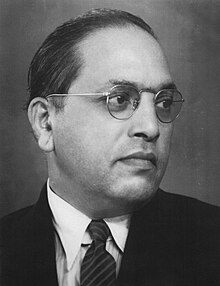
Back Bhimrao Ramji Ambedkar Afrikaans ቢምራኦ አምበድካር Amharic बाबासाहेब आंबेडकर ANP أمبيدكار Arabic امبيدكار ARZ ভীমৰাও ৰামজী আম্বেদকাৰ Assamese बाबासाहेब आंबेडकर AWA Бхімраа Амбедкар Byelorussian Бхімраа Рамджы Амбедкар BE-X-OLD Бхимрао Рамджи Амбедкар Bulgarian
B. R. Ambedkar | |||||||||||||||||||
|---|---|---|---|---|---|---|---|---|---|---|---|---|---|---|---|---|---|---|---|
 Ambedkar in the 1950s | |||||||||||||||||||
| 1st Minister of Law and Justice | |||||||||||||||||||
| In office 15 August 1947 – 6 October 1951 | |||||||||||||||||||
| President | Rajendra Prasad | ||||||||||||||||||
| Governors General | Louis Mountbatten C. Rajagopalachari | ||||||||||||||||||
| Prime Minister | Jawaharlal Nehru | ||||||||||||||||||
| Preceded by | Position established | ||||||||||||||||||
| Succeeded by | Charu Chandra Biswas | ||||||||||||||||||
| Member of Parliament, Rajya Sabha | |||||||||||||||||||
| In office 3 April 1952 – 6 December 1956 | |||||||||||||||||||
| Constituency | Bombay State | ||||||||||||||||||
| Chairman of the Constitution Drafting Committee | |||||||||||||||||||
| In office 29 August 1947 – 24 January 1950 | |||||||||||||||||||
| Member of the Constituent Assembly of India | |||||||||||||||||||
| In office 9 December 1946 – 24 January 1950 | |||||||||||||||||||
| Constituency | • Bengal Province (1946–47) • Bombay Province (1947–50) | ||||||||||||||||||
| Minister of Labour in Viceroy's Executive Council | |||||||||||||||||||
| In office 22 July 1942 – 20 October 1946 | |||||||||||||||||||
| Governors General | The Marquess of Linlithgow The Viscount Wavell | ||||||||||||||||||
| Preceded by | Feroz Khan Noon | ||||||||||||||||||
| |||||||||||||||||||
| Personal details | |||||||||||||||||||
| Born | Bhiva Ramji Sakpal 14 April 1891 Mhow, Central India Agency, British India (now Madhya Pradesh, India) | ||||||||||||||||||
| Died | 6 December 1956 (aged 65) New Delhi, India | ||||||||||||||||||
| Resting place | Chaitya Bhoomi 19°01′30″N 72°50′02″E / 19.02500°N 72.83389°E | ||||||||||||||||||
| Political party | Independent Labour Party Scheduled Castes Federation | ||||||||||||||||||
| Other political affiliations | Republican Party of India | ||||||||||||||||||
| Spouses | |||||||||||||||||||
| Children | Yashwant | ||||||||||||||||||
| Relatives | Ambedkar family | ||||||||||||||||||
| Education | University of Mumbai (BA, MA) Columbia University (MA, PhD) London School of Economics (MSc, DSc) | ||||||||||||||||||
| Profession |
| ||||||||||||||||||
| Awards | Bharat Ratna (1990, posthumous) | ||||||||||||||||||
| Signature |  | ||||||||||||||||||
| Nickname | Babasaheb | ||||||||||||||||||
Bhimrao Ramji Ambedkar (Bhīmrāo Rāmjī Āmbēḍkar; 14 April 1891 – 6 December 1956) was an Indian jurist, economist, social reformer and political leader who headed the committee drafting the Constitution of India from the Constituent Assembly debates, served as Law and Justice minister in the first cabinet of Jawaharlal Nehru, and inspired the Dalit Buddhist movement after renouncing Hinduism.
After graduating from Elphinstone College, University of Bombay, Ambedkar studied economics at Columbia University and the London School of Economics, receiving doctorates in 1927 and 1923, respectively, and was among a handful of Indian students to have done so at either institution in the 1920s.[1] He also trained in the law at Gray's Inn, London. In his early career, he was an economist, professor, and lawyer. His later life was marked by his political activities; he became involved in campaigning and negotiations for partition, publishing journals, advocating political rights and social freedom for Dalits, and contributing to the establishment of the state of India. In 1956, he converted to Buddhism, initiating mass conversions of Dalits.[2]
In 1990, the Bharat Ratna, India's highest civilian award, was posthumously conferred on Ambedkar. The salutation Jai Bhim (lit. "Hail Bhim") used by followers honours him. He is also referred to by the nickname Babasaheb (BAH-bə SAH-hayb), meaning "Respected Father".
- ^ Krishnamurty, J. (2020), "Ambedkar's Educational Odyssey, 1913–1927", Journal of Social Inclusion Studies, 5 (2), SAGE: 1–11, doi:10.1177/2394481119900074, S2CID 212824611,
(p. 2) Ambedkar obtained his London DSc degree in 1923 for his thesis 'Problem of the Rupee' (University of London, 1926). However, he was not the first Indian to achieve this feat. Records of the London University clearly show that John Matthai and Pramathanath Bandyopadhyay (more popularly known as Pramathanath Banerjea) obtained their DSc degrees from the university in 1916. ... (p. 3) Turning to US doctorates, while Ambedkar was one of the early Indians to work for a PhD in the USA, he was awarded his degree by Columbia University only in 1927. The first Indian PhD in Economics in the USA was probably Rajani Kanta Das, a labour economist, who worked with Professor John Commons and was awarded the PhD degree by the University of Wisconsin in 1917.
- ^ Buswell, Robert Jr; Lopez, Donald S. Jr., eds. (2013). Princeton Dictionary of Buddhism. Princeton, NJ: Princeton University Press. p. 34. ISBN 978-0691157863.
© MMXXIII Rich X Search. We shall prevail. All rights reserved. Rich X Search